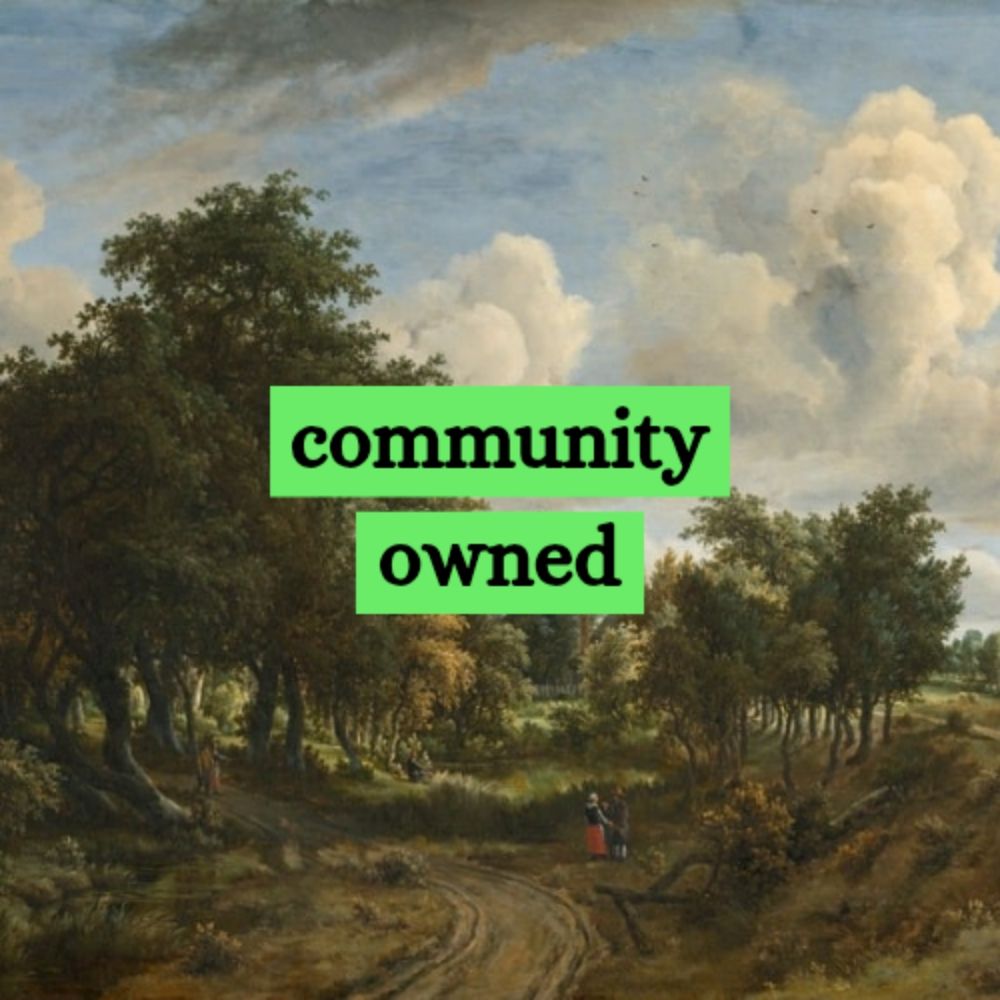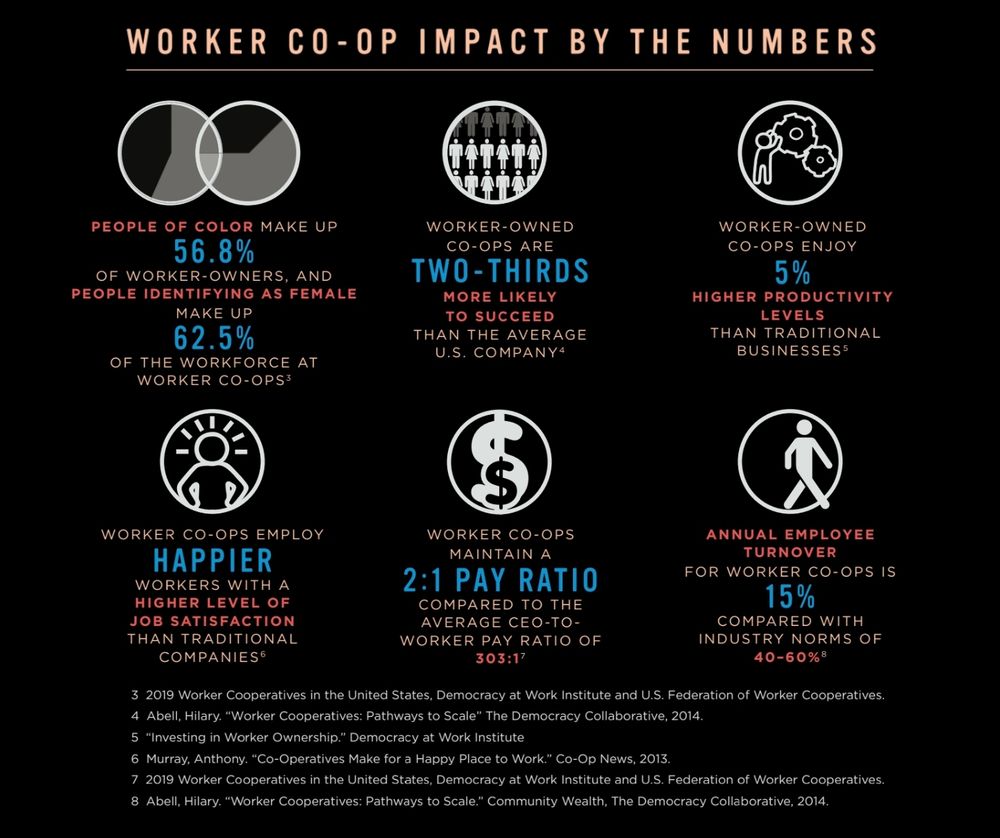

The Cooperative Economy
@cooperatives.bsky.social
Advocating for a democratic, equitable, and inclusive world through cooperatives, worker ownership, unions, mutual aid, and workplace democracy. 💜 People Above Profit ✊🏽 #EconomicDemocracy 🌲🌲 usworker.coop | ncbaclusa.coop | workers.coop | ica.coop
created November 15, 2024
26,395 followers 445 following 3,283 posts
view profile on Bluesky Posts
 The Cooperative Economy (@cooperatives.bsky.social)
The Cooperative Economy (@cooperatives.bsky.social)
Happy Labor Day. Workers are the foundation of the economy. There is no wealth creation without labor. Feel free to follow and support the worker-owned cooperatives here on Bluesky. As democratic organizations, they contribute to a more equitable and inclusive society for everyone.
 The Cooperative Economy (@cooperatives.bsky.social) reply parent
The Cooperative Economy (@cooperatives.bsky.social) reply parent
time, outcomes include the erosion of society's pursuit to meet the needs of the majority and respect for democratic decision-making is weakened or outright destroyed in favor of a plutocratic governance model. We must therefore look to shift our economic system towards needs-based production.
 The Cooperative Economy (@cooperatives.bsky.social) reply parent
The Cooperative Economy (@cooperatives.bsky.social) reply parent
Calling people names is not an effective way to convince someone of your position. What would be more productive is explaining how the profit motive perpetuates itself as capital accumulates/concentrates, forming an ever larger pool of capital that principally seeks to generate greater returns. Over
 The Cooperative Economy (@cooperatives.bsky.social)
The Cooperative Economy (@cooperatives.bsky.social)
Wealth inequality in the United States has increased substantially since 1989. As of Q1 2025, the top 0.1% own more than five times as much wealth as the bottom 50%. In 1989, the bottom 50% held 3.5% of total wealth. In 2025, they hold just 2.5%.
 The Cooperative Economy (@cooperatives.bsky.social) reply parent
The Cooperative Economy (@cooperatives.bsky.social) reply parent
Thank you for sharing about the worker ownership model. It has the potential to radically shift our economy and empower the disadvantaged in areas where conventional capitalism has failed. One study finds that it has the potential to reverse wealth inequality and lift up the great majority.
 The Cooperative Economy (@cooperatives.bsky.social)
The Cooperative Economy (@cooperatives.bsky.social)
Are you searching for an alternative to shareholder capitalism? Don't believe the people who say there isn't one. Cooperatives provide a sustainable, democratic, and equitable business model where stakeholders such as workers and customers participate in decisions and benefit from ownership.
 The Cooperative Economy (@cooperatives.bsky.social) reply parent
The Cooperative Economy (@cooperatives.bsky.social) reply parent
Taking a more relativistic perspective, a worker-owned AI company may tend to behave in more desirable ways because working conditions, benefits, work/life balance, and community impact are now at the forefront in ways they would not be under conventional owners.
 The Cooperative Economy (@cooperatives.bsky.social) reposted
The Cooperative Economy (@cooperatives.bsky.social) reposted
𝘚𝘵𝘢𝘳𝘣𝘶𝘤𝘬𝘴’ 𝘊𝘌𝘖 𝘱𝘢𝘺 𝘸𝘢𝘴 𝘵𝘩𝘦 𝘭𝘢𝘳𝘨𝘦𝘴𝘵 𝘨𝘢𝘱 𝘪𝘯 2024, 𝘸𝘪𝘵𝘩 𝘪𝘵𝘴 𝘊𝘌𝘖, 𝘉𝘳𝘪𝘢𝘯 𝘕𝘪𝘤𝘤𝘰𝘭, 𝘳𝘦𝘤𝘦𝘪𝘷𝘪𝘯𝘨 𝘵𝘰𝘵𝘢𝘭 𝘤𝘰𝘮𝘱𝘦𝘯𝘴𝘢𝘵𝘪𝘰𝘯 𝘸𝘰𝘳𝘵𝘩 $95.8𝘮, 6,666 𝘵𝘪𝘮𝘦𝘴 𝘢𝘴 𝘮𝘶𝘤𝘩 𝘢𝘴 𝘵𝘩𝘦 𝘤𝘰𝘮𝘱𝘢𝘯𝘺’𝘴 $14,674 𝘮𝘦𝘥𝘪𝘢𝘯 𝘱𝘢𝘺. This is authoritarian economics: unsustainable inequality and a politics that is increasingly ruled by the wealthy.
 The Cooperative Economy (@cooperatives.bsky.social) reply parent
The Cooperative Economy (@cooperatives.bsky.social) reply parent
An alternative is worker ownership where the workers own equity in the company and benefit based on how long they've been at the company. The amount paid out would not be based on what a small group of owners dictate. Distribution does not have to rely on the whims of unelected individuals.
 The Cooperative Economy (@cooperatives.bsky.social) reply parent
The Cooperative Economy (@cooperatives.bsky.social) reply parent
the United States, laws for worker ownership can vary widely by state and while there is a federal legal framework for ESOPs, there isn't for worker co-ops or trusts. ESOPs may be expensive to implement, especially for smaller businesses (which are the majority).
 The Cooperative Economy (@cooperatives.bsky.social) reply parent
The Cooperative Economy (@cooperatives.bsky.social) reply parent
Sole proprietorships are not considered worker-owned and would not be included in this kind of research. The employee ownership trust, employee stock ownership plan, and worker co-op are the three main broad-based worker ownership models. There are existing barriers that affect creation rates. In
 The Cooperative Economy (@cooperatives.bsky.social) reply parent
The Cooperative Economy (@cooperatives.bsky.social) reply parent
If socialism is worker ownership, socialism offers positive outcomes. Research tells us that worker-owned businesses are more productive and resilient. Worker-owners have been found to have higher savings and enjoy greater job stability. It has the potential to reverse wealth inequality.
 The Cooperative Economy (@cooperatives.bsky.social) reply parent
The Cooperative Economy (@cooperatives.bsky.social) reply parent
The Nazis were not socialists in practice. Similarly, the DPRK is not democratic in practice. Authoritarians co-opt words and ideologies for their own benefit.
 The Cooperative Economy (@cooperatives.bsky.social) reply parent
The Cooperative Economy (@cooperatives.bsky.social) reply parent
There are barriers to their creation. The co-op model benefits the poor the most, the same people who have access to the least amount of capital for starting a business. Awareness for the model is relatively low, combined with the small number of folks looking to create a business.
 E J Hartley 💚 (@idoneathunk.bsky.social) reposted
E J Hartley 💚 (@idoneathunk.bsky.social) reposted
An excellent campaign from @ethical-consumer.bsky.social discussing: - ditching for-profit companies - imagining a world without corporate power - the fight against the far-right - converting businesses to co-ops and social enterprises - challenging tech monopolies + loads more!
 The Cooperative Economy (@cooperatives.bsky.social) reply parent
The Cooperative Economy (@cooperatives.bsky.social) reply parent
A system that delivers on the idea of stakeholder participation within economic organization is the cooperative model where producers, workers, and consumers may have a democratic say. In a worker cooperative, the workers vote on issues and elect their management. This model addresses inequality.
 The Cooperative Economy (@cooperatives.bsky.social) reply parent
The Cooperative Economy (@cooperatives.bsky.social) reply parent
king of change. He references stakeholder capitalism (a model from the 1950s/60s) as what we should return to, but that economy is what brought us to the here and now. It's an undemocratic system that trends toward wealth concentration and it doesn't actually grant stakeholders a say in decisions.
 The Cooperative Economy (@cooperatives.bsky.social) reply parent
The Cooperative Economy (@cooperatives.bsky.social) reply parent
Taxing the rich is a good idea, but the rich will work to weaken and repeal these taxes. Taxes on wealth don't disappear the wealthy. Society must implement systemic change so that there is no possibility for a billionaire class to emerge in the first place. Robert Reich never seems to discuss this
 The Cooperative Economy (@cooperatives.bsky.social) reply parent
The Cooperative Economy (@cooperatives.bsky.social) reply parent
Labeling people incorrectly may undermine your position and what you are trying to achieve. Trump is not a representative of the working class. It is more accurate to use the word fascist. Fascism has a history of corporate and state fusion to suppress the communists and the left.
 The Cooperative Economy (@cooperatives.bsky.social) reply parent
The Cooperative Economy (@cooperatives.bsky.social) reply parent
Billionaires and capitalists exert disproportionate control over the economic system. There is no widespread manifestation of economic democracy. This is why there are terms like state capitalism - to differentiate the contexts in which state ownership is employed.
 The Cooperative Economy (@cooperatives.bsky.social) reply parent
The Cooperative Economy (@cooperatives.bsky.social) reply parent
State ownership/control is not unique to any one system. Fascism, feudalism, and civilizations like Egypt and the Inca have had widespread state ownership and control. What makes socialism is social ownership, and this can manifest in several forms including cooperative and municipal ownership.
 The Cooperative Economy (@cooperatives.bsky.social) reply parent
The Cooperative Economy (@cooperatives.bsky.social) reply parent
Socialism entails social ownership of the means of production by workers. Having a 10% ownership stake in a capitalist business is not socialism, especially when the government is influenced by billionaires and corporate interests and workers don't have a say in what Intel does.
 The Cooperative Economy (@cooperatives.bsky.social) reply parent
The Cooperative Economy (@cooperatives.bsky.social) reply parent
Saudi Arabia has a 𝘴𝘵𝘢𝘵𝘦 𝘤𝘢𝘱𝘪𝘵𝘢𝘭𝘪𝘴𝘵 economy. State capitalism is distinct from conventional capitalism.
 The Cooperative Economy (@cooperatives.bsky.social) reply parent
The Cooperative Economy (@cooperatives.bsky.social) reply parent
The word 'state' is a key modifier that creates the distinction from conventional capitalism. The state engages in commercial activity, behaving as a kind of business, employing workers to extract surplus value for a profit. This is not too dissimilar from the behavior of private firms.
 The Cooperative Economy (@cooperatives.bsky.social) reply parent
The Cooperative Economy (@cooperatives.bsky.social) reply parent
Saudi Arabia employs a state capitalist economy. It is not a socialist economy. Workers do not own or control the means of production. State capitalism is not synonymous to socialism.
 The Cooperative Economy (@cooperatives.bsky.social) reply parent
The Cooperative Economy (@cooperatives.bsky.social) reply parent
State capitalism. Socialism entails social ownership.
 The Cooperative Economy (@cooperatives.bsky.social) reply parent
The Cooperative Economy (@cooperatives.bsky.social) reply parent
Classical socialism is more about common ownership over the means of production by workers and communities directly. Cooperative ownership is an example. These ideas predate the USSR (which employed state ownership). Figures like Charles Fourier and Robert Owen are foundational.
 The Cooperative Economy (@cooperatives.bsky.social) reply parent
The Cooperative Economy (@cooperatives.bsky.social) reply parent
It can be a spectrum in practice. China has a state capitalist economy but there are also private billionaire owners.
 The Cooperative Economy (@cooperatives.bsky.social) reply parent
The Cooperative Economy (@cooperatives.bsky.social) reply parent
State capitalism is a more accurate label. The government is controlled and influenced by billionaires (capitalists) and corporate interests, not the working class. Note that fascists have a history of utilizing the state to own/run industry in benefit of an elite class.
 The Cooperative Economy (@cooperatives.bsky.social) reply parent
The Cooperative Economy (@cooperatives.bsky.social) reply parent
It's important to get definitions right, or we may undermine our own position and credibility. Democratic socialism is a philosophy based on economic democracy alongside democratic government. State ownership is not socialistic unless it is a form of social ownership in practice.
 The Cooperative Economy (@cooperatives.bsky.social) reply parent
The Cooperative Economy (@cooperatives.bsky.social) reply parent
Democratic socialism is an economic and political philosophy that entails some form of a socially owned economy alongside a democratic government system. Workplace democracy is often strongly supported by democratic socialists. This organizational model is related to the economic system.
 The Cooperative Economy (@cooperatives.bsky.social) reply parent
The Cooperative Economy (@cooperatives.bsky.social) reply parent
A more apt description for what is happening is state capitalism.
 The Cooperative Economy (@cooperatives.bsky.social) reply parent
The Cooperative Economy (@cooperatives.bsky.social) reply parent
It's more accurate to label them as fascists and state capitalists. The corporate and state interests align to suppress workers' rights and leftist philosophies to ensure profit can be concentrated without issue. Communism is the leftist philosophy they hate the most as it's about shared ownership.
 The Cooperative Economy (@cooperatives.bsky.social) reply parent
The Cooperative Economy (@cooperatives.bsky.social) reply parent
Is Norway a communist nation?
 The Cooperative Economy (@cooperatives.bsky.social) reply parent
The Cooperative Economy (@cooperatives.bsky.social) reply parent
A more applicable term is state capitalism.
 The Cooperative Economy (@cooperatives.bsky.social) reply parent
The Cooperative Economy (@cooperatives.bsky.social) reply parent
State ownership is not synonymous with socialism. Socialism entails social ownership over the means of production. If the state is authoritarian in practice and society does not have a say in decisions or benefit, it is not a form of social ownership and therefore does not qualify as socialism.
 The Cooperative Economy (@cooperatives.bsky.social) reply parent
The Cooperative Economy (@cooperatives.bsky.social) reply parent
State capitalism is an apt label.
 The Cooperative Economy (@cooperatives.bsky.social)
The Cooperative Economy (@cooperatives.bsky.social)
𝘚𝘵𝘢𝘳𝘣𝘶𝘤𝘬𝘴’ 𝘊𝘌𝘖 𝘱𝘢𝘺 𝘸𝘢𝘴 𝘵𝘩𝘦 𝘭𝘢𝘳𝘨𝘦𝘴𝘵 𝘨𝘢𝘱 𝘪𝘯 2024, 𝘸𝘪𝘵𝘩 𝘪𝘵𝘴 𝘊𝘌𝘖, 𝘉𝘳𝘪𝘢𝘯 𝘕𝘪𝘤𝘤𝘰𝘭, 𝘳𝘦𝘤𝘦𝘪𝘷𝘪𝘯𝘨 𝘵𝘰𝘵𝘢𝘭 𝘤𝘰𝘮𝘱𝘦𝘯𝘴𝘢𝘵𝘪𝘰𝘯 𝘸𝘰𝘳𝘵𝘩 $95.8𝘮, 6,666 𝘵𝘪𝘮𝘦𝘴 𝘢𝘴 𝘮𝘶𝘤𝘩 𝘢𝘴 𝘵𝘩𝘦 𝘤𝘰𝘮𝘱𝘢𝘯𝘺’𝘴 $14,674 𝘮𝘦𝘥𝘪𝘢𝘯 𝘱𝘢𝘺. This is authoritarian economics: unsustainable inequality and a politics that is increasingly ruled by the wealthy.
 The Cooperative Economy (@cooperatives.bsky.social)
The Cooperative Economy (@cooperatives.bsky.social)
Research shows that worker-owned businesses tend to be more productive, grow faster, offer greater employment stability, survive longer, and employ happier workers than non-worker-owned companies. Billionaires are middlemen. Workers are capable of owning and managing economic organization.
 The Cooperative Economy (@cooperatives.bsky.social) reply parent
The Cooperative Economy (@cooperatives.bsky.social) reply parent
There are more than 300,000 cooperative worker-members in Spain and over 500,000 in Italy. According to CICOPA, there are at least 11 million cooperative worker-members in the world.
 The Cooperative Economy (@cooperatives.bsky.social) reply parent
The Cooperative Economy (@cooperatives.bsky.social) reply parent
Democratic socialists generally wish to reform toward a system of economic democracy where workers may be able to vote in their workplace and economic decisions are made by communities instead of by private, wealthy, and corporate actors. Studies show that economic democracy is a viable ideal.
 The Cooperative Economy (@cooperatives.bsky.social) reply parent
The Cooperative Economy (@cooperatives.bsky.social) reply parent
Governments regularly fund private enterprise and governments can be undemocratic without meaningful control by the people. Social ownership entails social control. The government funding things is not a model for social ownership, but state ownership can be a form of social ownership.
 The Cooperative Economy (@cooperatives.bsky.social) reply parent
The Cooperative Economy (@cooperatives.bsky.social) reply parent
that cooperatives protect jobs better and provide more stable employment, which is highly impactful in an economy of layoffs and uncertainty. Workers tend to be happier and more productive as well. Income distributions are significantly more equitable, contributing to more equal societies.
 The Cooperative Economy (@cooperatives.bsky.social) reply parent
The Cooperative Economy (@cooperatives.bsky.social) reply parent
That is unfortunate, but it does not invalidate existing research on worker cooperatives and their benefits. Many low-income workers are able to build wealth for themselves through collective ownership. Disadvantaged groups are empowered by being able to influence economic decisions. Studies show
 The Cooperative Economy (@cooperatives.bsky.social) reply parent
The Cooperative Economy (@cooperatives.bsky.social) reply parent
When small businesses are democratic workplaces, workers benefit. The wealthy dislike the idea of worker ownership and control because of its decentralization of economic power.
 The Cooperative Economy (@cooperatives.bsky.social) reply parent
The Cooperative Economy (@cooperatives.bsky.social) reply parent
The top 1% would likely lose much of their wealth and the systems to concentrate great amounts of wealth would be less prevalent. On the other hand, the bottom 90% would see large gains in wealth and wealth inequality would significantly decrease. Here's a relevant study on this topic.
 The Cooperative Economy (@cooperatives.bsky.social) reply parent
The Cooperative Economy (@cooperatives.bsky.social) reply parent
Worker cooperatives, workplaces that workers collectively own and democratically manage, are the foundation for a truly democratic society. There is no real democracy until our economy is a democracy.
 The Cooperative Economy (@cooperatives.bsky.social) reply parent
The Cooperative Economy (@cooperatives.bsky.social) reply parent
Here are some relevant networks and organizations that are participating in the growth of the democratic economy. usworker.coop cdi.coop sharedcapital.coop rmeoc.org project-equity.org
 The Cooperative Economy (@cooperatives.bsky.social) reply parent
The Cooperative Economy (@cooperatives.bsky.social) reply parent
This is a serious thing to acknowledge and fight. There are people who don't want women to have power. They want women to follow their husbands and for men to hold power in the household and in society as a whole. Rights can be taken away if we become complacent. We must always fight.
 The Cooperative Economy (@cooperatives.bsky.social) reply parent
The Cooperative Economy (@cooperatives.bsky.social) reply parent
The Entertainer joins hundreds of other UK businesses that are handing ownership to their workers this year. Since the introduction of powerful employee ownership legislation in 2014, the number of UK worker-owned businesses has risen from a few hundred to well over 2,000.
 The Cooperative Economy (@cooperatives.bsky.social)
The Cooperative Economy (@cooperatives.bsky.social)
Gary and Catherine Grant, founders of the UK's largest toy shop chain The Entertainer, are transferring 100% ownership to their employees. The store's workers will benefit from a share in the profits and will be able to participate in company decisions.
 The Cooperative Economy (@cooperatives.bsky.social) reply parent
The Cooperative Economy (@cooperatives.bsky.social) reply parent
We can support the creation of cooperative networks and organizations that educate, provide seed capital, and collaborate. This is already occuring. As a bottom-up movement, it represents the interests of the working class and expands democracy into our economy over time.
 The Cooperative Economy (@cooperatives.bsky.social) reply parent
The Cooperative Economy (@cooperatives.bsky.social) reply parent
Undemocratic economic models should be phased out over time in favor of democratic ones. As long they exist, a small class of individuals will be able to control the profit created by the working class and use it to further enrich themselves by influencing government and society.
 The Cooperative Economy (@cooperatives.bsky.social) reply parent
The Cooperative Economy (@cooperatives.bsky.social) reply parent
Socialism encompasses several forms of ownership. Many support ownership by workers and communities through municipal and cooperative models where people can participate in the economic decisions that affect them. The decentralization of economic power is how society becomes more democratic.
 The Cooperative Economy (@cooperatives.bsky.social) reply parent
The Cooperative Economy (@cooperatives.bsky.social) reply parent
contributes to mental wellbeing. Organizational participation is linked with productivity and satisfaction. Worker-owned firms enhance psychological ownership, increasing motivation and commitment at work. The alignment of incentives also boosts productivity as workers have a stake in the business.
 The Cooperative Economy (@cooperatives.bsky.social) reply parent
The Cooperative Economy (@cooperatives.bsky.social) reply parent
Libertarian forms of socialism foster positive aspects of human nature, according to research. For example, workers are found to be more satisfied in worker cooperatives relative to other companies in the same industry. The feeling of having more control in the workplace where so much time is spent
 The Cooperative Economy (@cooperatives.bsky.social) reply parent
The Cooperative Economy (@cooperatives.bsky.social) reply parent
Social and worker ownership is viable according to research. Worker-owned and cooperative businesses match or exceed traditional companies in productivity, employment stability, firm survival, and worker satisfaction. Municipal ownership has also been found to deliver positive outcomes.
 The Cooperative Economy (@cooperatives.bsky.social) reply parent
The Cooperative Economy (@cooperatives.bsky.social) reply parent
The viable alternative: worker-owned businesses and cooperative enterprises, where workers benefit from equity ownership and may democratically participate in company decisions. Unfortunately, Mark Cuban doesn't seem to be at all interested in the idea of decentralizing economic power.
 The Cooperative Economy (@cooperatives.bsky.social) reply parent
The Cooperative Economy (@cooperatives.bsky.social) reply parent
There are businesses that are structured as worker democracies where labor participates in decisions having to do with income distributions (and other things). It is an alternative way to decide what people are paid.
 The Cooperative Economy (@cooperatives.bsky.social) reply parent
The Cooperative Economy (@cooperatives.bsky.social) reply parent
We also know that worker ownership is associated with increases to productivity, firm survival, employment stability, savings per worker, and worker satisfaction. It has the potential to reverse wealth inequality.
 The Cooperative Economy (@cooperatives.bsky.social) reply parent
The Cooperative Economy (@cooperatives.bsky.social) reply parent
There are multistakeholder cooperatives structured with that in mind. A grocery co-op may have 45% control by workers, 40% by customers, and 15% by volunteers. Each member has one vote within their stakeholder group.
 The Cooperative Economy (@cooperatives.bsky.social) reply parent
The Cooperative Economy (@cooperatives.bsky.social) reply parent
The way to structure this is to implement forms of social ownership by communities. Everyone has an equal say in production and distribution by virtue of being affected by those decisions. Participatory budgeting is an effective tool for people to democratically decide where funding goes.
 Red Emma’s (@redemmas.org) reposted
Red Emma’s (@redemmas.org) reposted
Last week we hosted the first ever national gathering of worker co-op restaurants here in Baltimore— @jnoor.bsky.social wrote up a post-convening report for @baltimorebeat.bsky.social: baltimorebeat.com/how-baltimor...
 The Cooperative Economy (@cooperatives.bsky.social) reply parent
The Cooperative Economy (@cooperatives.bsky.social) reply parent
Today's system of shareholding is largely plutocratic and therefore problematic to the idea of democratic society. Those with the most wealth may purchase the most shares and exert their influence over decisions that affect others. The ownership model of one-person, one-vote is a viable alternative.
 The Cooperative Economy (@cooperatives.bsky.social) reply parent
The Cooperative Economy (@cooperatives.bsky.social) reply parent
We can interchange ownership by labor with ownership by society for the context of the future, but in today's society and for human history, labor remains a relevant term for now.
 The Cooperative Economy (@cooperatives.bsky.social) reply parent
The Cooperative Economy (@cooperatives.bsky.social) reply parent
A more useful definition may be an individual who owns without contributing the labor necessary and employs workers for that purpose. If labor socially owns the means of production, it would constitute a socialist mode of ownership and there would be no capitalist.
 The Cooperative Economy (@cooperatives.bsky.social) reply parent
The Cooperative Economy (@cooperatives.bsky.social) reply parent
Wage labor, employer/employee, private ownership, and markets are all predominant aspects of the United States economy, making it a form of capitalism. Economic democracy is empirically viable: worker-owned businesses, cooperatives, community land trusts, participatory budgeting, among others.
 The Cooperative Economy (@cooperatives.bsky.social) reply parent
The Cooperative Economy (@cooperatives.bsky.social) reply parent
Democracy's purpose is to grant individuals a say in the decisions that affect them. While this may be true in the political sphere of our society, it is not so true in the economic sphere. Most people experience relatively little or even no say in the daily economic decisions that affect them.
 The Cooperative Economy (@cooperatives.bsky.social) reply parent
The Cooperative Economy (@cooperatives.bsky.social) reply parent
The power structures of capitalism is one based in plutocracy. The wealthy own the largest shares in the largest businesses, granting them control over the lives of millions of people. They influence the distribution of profits and enrich themselves regardless of how it might affect workers.
 The Cooperative Economy (@cooperatives.bsky.social) reply parent
The Cooperative Economy (@cooperatives.bsky.social) reply parent
The resulting economic relationship emergent from capitalism's model of ownership is employer/employee, where employers make decisions that affect employees. Employers are not elected. A democratic system entails workplace democracy and a system where labor is management or elects that body.
 The Cooperative Economy (@cooperatives.bsky.social) reply parent
The Cooperative Economy (@cooperatives.bsky.social) reply parent
The United States practices capitalism. Socialism entails social ownership over the means of production by the working class. Capitalism as an economic system is undemocratic, and quite obviously so. Firms are organized as plutocracies where the wealthy make the decisions. Management is not elected.
 The Cooperative Economy (@cooperatives.bsky.social) reply parent
The Cooperative Economy (@cooperatives.bsky.social) reply parent
Majority of cuts are for the wealthy. Socialism means the working class keeps more of the value they create rather than having to subsidize billionaire tax cuts and corporate bailouts. Think of a worker-owned cooperative - instead of profit being funneled to a billionaire, it goes to the workers.
 The Cooperative Economy (@cooperatives.bsky.social) reply parent
The Cooperative Economy (@cooperatives.bsky.social) reply parent
There is support for the sky being blue. You have not provided support for your claim.
 The Cooperative Economy (@cooperatives.bsky.social) reply parent
The Cooperative Economy (@cooperatives.bsky.social) reply parent
Capitalism is an undemocratic economic system. Placing "democratic" in front of it would be misleading. On the other hand, the basis for socialism is social ownership over the means of production by the working class, which entails economic democracy and structures like cooperatives and WOBs.
 The Cooperative Economy (@cooperatives.bsky.social) reply parent
The Cooperative Economy (@cooperatives.bsky.social) reply parent
You've suggested that there is conversation to be had. The question was asked to give you the opportunity to support your claim.
 The Cooperative Economy (@cooperatives.bsky.social) reply parent
The Cooperative Economy (@cooperatives.bsky.social) reply parent
Can you provide evidence that the USSR's working class owned and controlled their means of production through democratic structures?
 The Cooperative Economy (@cooperatives.bsky.social) reply parent
The Cooperative Economy (@cooperatives.bsky.social) reply parent
The Soviet state exercised ownership and control over its economy in a centralized manner, extracting surplus from labor in much the same way private capitalists do. The workers had limited influence over the economy. It is difficult to make the claim that it was socialism in practice.
 The Cooperative Economy (@cooperatives.bsky.social) reply parent
The Cooperative Economy (@cooperatives.bsky.social) reply parent
Libertarianism is originally a synonym for libertarian socialism and anarchism and was first used by the anarchist Joseph Déjacque in the 19th century. It was co-opted by the right in the United States in the 20th century. It still retains its original meaning in many European countries.
 The Cooperative Economy (@cooperatives.bsky.social) reply parent
The Cooperative Economy (@cooperatives.bsky.social) reply parent
It's bad for business. The obscenely rich are very attached to their profit margins. Anything that threatens their ability to accumulate as much wealth as possible is enemy number one. The propaganda against socialism is largely funded by these kinds of people.
 The Cooperative Economy (@cooperatives.bsky.social) reply parent
The Cooperative Economy (@cooperatives.bsky.social) reply parent
Socialism is an umbrella term that includes philosophies which espouse some form of social ownership by the working class. There are socialisms that entail no state ownership, such as anarchism, while others are for state, municipal, and/or cooperative ownership as expressions of social ownership.
 The Cooperative Economy (@cooperatives.bsky.social) reply parent
The Cooperative Economy (@cooperatives.bsky.social) reply parent
Concentrations in wealth as a result of capitalist ownership models means the concentration of leisure time. While many who work struggle to earn enough to afford the means for dignified life, the wealthy are able to sit idle indefinitely. This undemocratic economy is not sustainable.
 The Cooperative Economy (@cooperatives.bsky.social) reply parent
The Cooperative Economy (@cooperatives.bsky.social) reply parent
of that leisure time. This creates a productivity disincentive as workers are not rewarded with more leisure time for working harder. In contrast, a democratic workplace where workers together dictate leisure time will distribute it more equitably, forming a powerful incentive to be more productive.
 The Cooperative Economy (@cooperatives.bsky.social)
The Cooperative Economy (@cooperatives.bsky.social)
Productivity increases are desirable in order to decrease the time necessary to produce the same amount of things. This increases leisure time. The issue arises when control over the leisure time that results from higher productivity is by an unelected wealthy class who grants themselves a majority
 The Cooperative Economy (@cooperatives.bsky.social) reply parent
The Cooperative Economy (@cooperatives.bsky.social) reply parent
Worker cooperatives are a pretty darn good answer. An expansion of democracy into our economy leads to better outcomes for working class people. www.usworker.coop/what-is-a-wo...
 The Cooperative Economy (@cooperatives.bsky.social) reply parent
The Cooperative Economy (@cooperatives.bsky.social) reply parent
Private equity is concentrating wealth and power. Democratic society is not compatible with undemocratic economic control, which is why we must advocate for economic democracy: worker-owned businesses, cooperative enterprises, community land trusts, participatory budgeting, and labor unions.
 The Cooperative Economy (@cooperatives.bsky.social) reply parent
The Cooperative Economy (@cooperatives.bsky.social) reply parent
grocery store in select regions that are underserved by private companies is what Mamdani is proposing. He is not advocating for all private groceries to be abolished or for hundreds of municipal grocery stores to be established. Let's hope his policy successfully addresses food deserts in NYC.
 The Cooperative Economy (@cooperatives.bsky.social) reply parent
The Cooperative Economy (@cooperatives.bsky.social) reply parent
If the government can effectively run stores to keep goods affordable for military folks, then why is it not a good idea when it comes to people who are struggling to afford their basic necessities? Many are hurting because of food deserts, rising prices, and scarce store locations. A government-run
 The Cooperative Economy (@cooperatives.bsky.social) reply parent
The Cooperative Economy (@cooperatives.bsky.social) reply parent
Something to note is that there are many government-run grocery stores in the United States. They're called commissaries. They exist in military bases and provide products slightly above cost so it remains affordable. These help military families afford their needs, especially in more rural areas.
 The Cooperative Economy (@cooperatives.bsky.social) reply parent
The Cooperative Economy (@cooperatives.bsky.social) reply parent
Studies show that worker-owned businesses and cooperative enterprises outperform conventional companies in savings per worker, productivity, survival, employment stability, and worker satisfaction. The issue isn't that these models do not work, but rather that support is often lackluster for them.
 The Cooperative Economy (@cooperatives.bsky.social) reply parent
The Cooperative Economy (@cooperatives.bsky.social) reply parent
There are places where many firms are cooperative and labor-managed. The Basque region in Spain is home to Mondragon and other worker co-ops, while Italy's Emilia-Romagna yields 30% or more of its GDP from cooperative enterprises. Social cooperatives provide 85% of care services in Bologna.
 The Cooperative Economy (@cooperatives.bsky.social) reply parent
The Cooperative Economy (@cooperatives.bsky.social) reply parent
@51st.news is a worker-led nonprofit media organization. If you're interested in media controlled by journalists and not billionaires, here is a starter pack of outlets on Bluesky. go.bsky.app/4vBEs7Z
 The Cooperative Economy (@cooperatives.bsky.social)
The Cooperative Economy (@cooperatives.bsky.social)
More businesses are looking to alternative models to preserve their community focus and identity. Instead of being shut down or sold to corporate entities that only care for profit, businesses can be owned by their workers and community members to equitably distribute economic power and wealth.
 The Cooperative Economy (@cooperatives.bsky.social) reply parent
The Cooperative Economy (@cooperatives.bsky.social) reply parent
Billionaires certainly are not a necessary component for job creation. Worker-owned businesses are better at creating and preserving employment than other companies.
 The Cooperative Economy (@cooperatives.bsky.social) reply parent
The Cooperative Economy (@cooperatives.bsky.social) reply parent
I did not say that social programs are socialism.
 The Cooperative Economy (@cooperatives.bsky.social) reply parent
The Cooperative Economy (@cooperatives.bsky.social) reply parent
Exactly. We shouldn't subsidize billionaires who sit idly on the backs of working people. The working class should keep what they make and work to create communities where they control their work instead of distant billionaires who only care about maximizing profits.
 The Cooperative Economy (@cooperatives.bsky.social) reply parent
The Cooperative Economy (@cooperatives.bsky.social) reply parent
Economic democracy, the general premise of democratic socialism, would support an effective and sustainable distribution of wealth. Social programs alone do not address the ways in which the economic system is largely ruled by a small group of private owners who will work to repeal those programs.
 The Cooperative Economy (@cooperatives.bsky.social) reply parent
The Cooperative Economy (@cooperatives.bsky.social) reply parent
Democratic Socialism is the philosophy that all people, regardless of wealth or status, are entitled to have a voice in the political and economic decisions that affect them. It is the complete rejection of authoritarianism in all its forms, from dictatorial government to oppressive corporation.
 The Cooperative Economy (@cooperatives.bsky.social) reply parent
The Cooperative Economy (@cooperatives.bsky.social) reply parent
Ths kind of wealth concentration is not sustainable or just. It's time for more economic democracy. U.S. worker cooperatives, which are businesses democratically controlled by their workers, have a pay ratio of 2:1.
 The Cooperative Economy (@cooperatives.bsky.social) reply parent
The Cooperative Economy (@cooperatives.bsky.social) reply parent
If you'd like to support democratic businesses where workers participate in company decisions, there are a few listed here. www.usworker.coop/directory/
 The Cooperative Economy (@cooperatives.bsky.social) reply parent
The Cooperative Economy (@cooperatives.bsky.social) reply parent
The fact you've assumed I'm a man. Take care!
The Cooperative Economy (@cooperatives.bsky.social)



